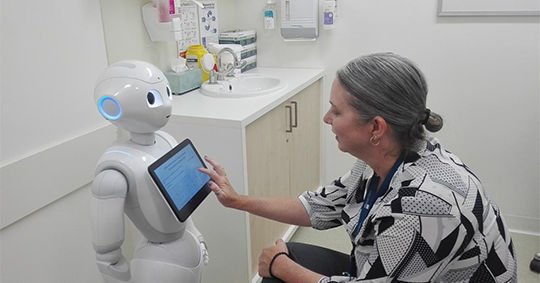By Ashley Lipman
Image source: https://cdn.pixabay.com/photo/2017/02/01/13/53/analysis-2030265_960_720.jpg
The future is hard to imagine for most industries, given the range of recent technological advancements driving them forward. Even medicine, a traditionally change-resistant field, is seeing massive transformations on the horizon.
Some trends are possible to intuit, though. Notably, tech-facilitated medical care and education and new solutions to age-old problems are all entering the realm of possibilities.
Let's delve deeper into these developments.
Connected Healthcare
The root of the physician role shift lies in the sheer amount of information now at their disposal.
The RevenueXL ideas are a great display of what EMR software brings to practitioners. Medical record software replaces traditional, paper-based patient charts with their digital versions. It presents doctors with searchable, evidence-based repositories, including:
Previous diagnosesMedications and treatments
Immunization history
Allergies and sensitivities
Tests, lab results, radiology images
While the decision-making responsibilities stay the same, the processes behind them change. The goal of this better-connected health industry trend is to reduce trial-and-error and improve efficiency. Moreover, these advancements suggest better communication between physicians and patients. Medical portals give people easy access to all relevant data, reducing wasted time and stress on both ends.
EMRs and e-prescriptions are optional for now. Practices are massively adopting these technologies, though, pushing the tidal wave of innovation forward.
Updated Logistics
While technology seeks to strengthen this workforce, it's far from advanced enough to replace it. It's more focused on automating this sector to boost efficiency across the board.
There might be an improvement in hospital designs as a whole. The idea is to extend healthcare access and reduce physicians' non-treatment workloads. These reforms guarantee fewer errors, shorter waiting times, and more frequent visits.
Emerging Technological Solutions
VR, AR, AI – these abbreviations are no longer exclusive to the game development industry. They're bringing a massive scope of capabilities to current and future practitioners, too.
Artificial Intelligence
AI algorithms have the potential to revamp healthcare. They can perform the following with little to no error:
Explore medical recordsDetermine potential diagnoses
Develop medication
Design treatment plans
Considering the ever-increasing amount of data doctors have to juggle, AI is becoming an invaluable care aspect.
Virtual Reality
VR is prominent in training future surgeons. It promises to make complex, lengthy procedures more accessible to the general population.
Another widespread use of VR tech is pain management. Soothing landscapes can take people through labor, post-surgical, and neurological pains.
Augmented Reality
AR can better prepare students for real-life procedures to follow. Accurate virtual depictions of human anatomy also reduce the need for subjects in medical classes.
Robotic Assistance
Symptom and condition management take precedence over treatment plans with aging patients. Robotic solutions help seniors prolong their independence and facilitate day-to-day tasks.
It's not limited to seniors, either. Robotics in healthcare can help people of all ages with chronic conditions live a more autonomous, pain-free life.
For example, exoskeletons became a realistic possibility in 2019. Support to hurt or paralyzed body parts is also worth mentioning.
Other, less sci-fi-looking robots are there to help with mental health issues and treatment distribution. Automated machinery can now monitor medications, breathing rates, and temperature. These companions also tell stories and respond to simple voice commands.
Key Takeaways
Overall, it seems that technology plays a crucial role in the medical industry's prospects. The progressions lead to better experiences for the patient, the doctor, and everybody in-between.
Admittedly, some of these solutions might seem impossible for most practices today. Still, they're evolving and becoming more viable with each passing day.
Discover more Healthcare Robots with RobotLAB!

Check more information here: https://business.robotlab.com/

